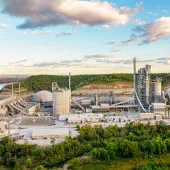Holcim and Eni explore breakthrough CCUS technology

Carbon captured and stored in olivine for use as low-emission raw material in green cement
HOLCIM have partnered with Eni to advance their carbon capture portfolio, repurposing CO2 from their operations into their green cement. As a world leading energy company, Eni are putting their carbon capture and mineralization expertise to work to store CO2 in olivine, a widely available mineral.
Researchers at Holcim’s Innovation Centre are exploring the use of this carbonated olivine as a new low-emission raw material for the formulation of its green cement. Holcim and Eni’s global operations, combined with olivine’s broad availability worldwide, would make this carbon capture, utilization, and storage (CCUS) solution highly scalable.
It would allow the permanent sequestration of CO2 into building materials for greener construction, adding to Holcim’s existing broad range of innovative low-emission raw materials. The partnership is in line with Holcim’s net-zero journey, as well as Eni’s commitment to decarbonize their sector.
Edelio Bermejo, head of Holcim’s Innovation Centre, said: ‘The world needs transformational technologies to accelerate our transition to net zero. With the storage of CO2 in new minerals like olivine, we are expanding our range of green cement solutions to make sustainable construction a reality around the world, while reducing the footprint of our operations.
‘Our work with Eni is in line with our open innovation ecosystem, partnering with like-minded organizations, from start-ups to multinationals, to make a bigger difference together. Eni’s solution is very promising, and we are happy to explore its potential as it could take us all one step further on our decarbonization journey.’
Monica Spada, Eni’s head of research and technological innovation, said: ‘Innovation and technological development are the strategic keys to successfully tackling the challenge of the energy transition. We are delighted about this collaboration, which will leverage Eni’s R&D expertise and Holcim's experience. This technology allows us to accelerate on our path towards decarbonization, by providing a suitable solution for the hard-to-abate sectors.’
Holcim are currently mapping their most relevant sites in Europe to conduct industrial-scale pilots, to decarbonize their operations while expanding their green cement range. The company’s research team will focus on characterizing the mechanical properties of carbonated olivine in concrete production as a new breakthrough raw material.
This new partnership adds to Holcim’s CCUS portfolio, which now encompasses more than 30 projects across the US, Canada, and Europe, ranging from recycling CO2 for crop growth in greenhouses, to using it as a source of alternative fuel for aviation.









